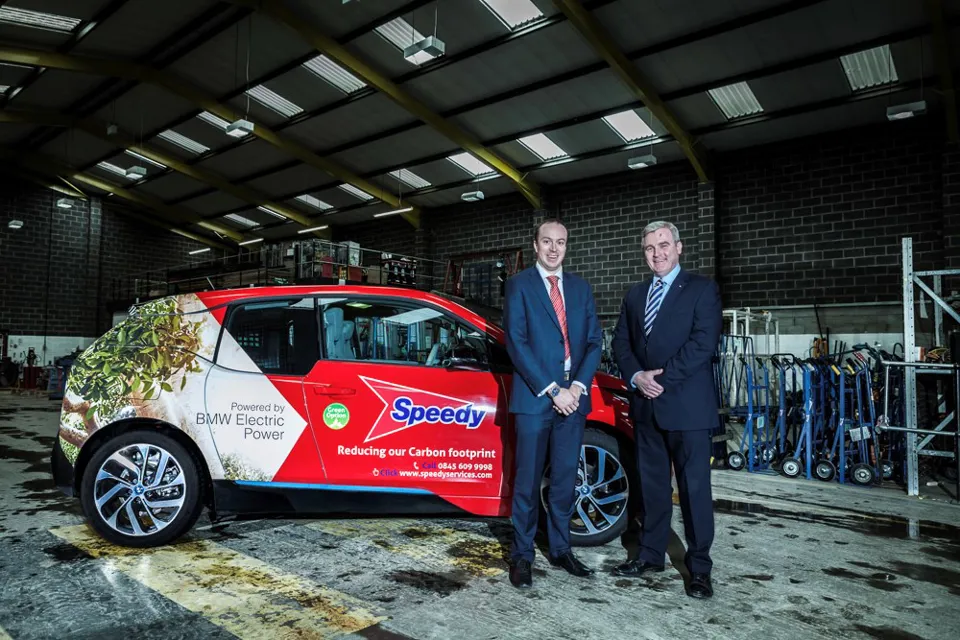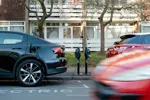Three BMW i3s have been specially adapted for commercial use as part of a three-month trial.
Tool hire company Speedy Services could save up to £3,000 per year in congestion charge fees alone by using an i3 in place of a Transit and is keen to investigate other savings associated with operating EVs, such as fuel and tax.
It also wants to increase its green credentials and both companies are keen to see how the vehicle performs on fleet.
Head of transport and logistics at Speedy Services Mark Woodworth said: “We’ve been looking at electric vans for a number of years and have been unable to find one that suits our needs.
“The i3, with range-extender, is the ideal powertrain set-up for us. It provides confidence for my drivers, who worry about being stranded on longer trips, and reduces vehicle downtime caused by charging.”
He explained that, despite the lower miles covered in town, the nature of the business requires the fleet to be fully serviceable all day. EV charging times would put that at risk.
The optional range extender is a 650cc two-cylinder petrol engine that is built into the rear axle, emitting just 13g/km of CO2. The engine has no link to the wheels, as with a conventional hybrid, and is used purely to generate electricity.
The £31,000 i3 gives a range of around 100 miles, rising to 180 if you employ the range extender’s 9.0-litre tank of unleaded. But Woodworth has covered 800 miles by charging overnight, and has only needed to use petrol for 11 miles.
A £1,000 BMW-i wallbox is installed at each depot to charge the i3s. It takes around three hours if the battery is empty and costs an average £2.26. Running on electricity could save £13 for every 100 miles travelled in a diesel van, but the small i3 would need to make more trips to carry the same load.
Drivers are also encouraged to use free fast-charge stations around London, which can take the car to 80% range in just half an hour.
Speedy Services has deployed two i3s in London and one in Manchester. Woodworth said the latter was to get a better understanding of how easily an EV can be operated outside London, where charging points are less common.
“Once the charging infrastructure is in place we could use electric vehicles in every city centre, but currently London is the easiest place to find a charge,” he said.
The vehicles are used predominantly for delivering survey kits and hand tools for emergency hire and for breakdowns where an engineer is required on-site quickly.
Jon Jacks, key account manager for BMW group fleet and business sales, said: “By working closely with Speedy Services to understand its commercial fleet needs, we were able to offer a tailored solution. We are eagerly awaiting the results of the three-month trial and will support Speedy Services throughout.”
BMW created the i3 van concept by removing the rear seats and interior panels, lining the floor and fitting grilles against the windows. A tailored vinyl wrap completes the transformation. It has a maximum payload of 450kg but is likely to max out on volume before weight.
Woodworth said: “We are looking for a bigger electric vehicle that has the same technology as the i3 but can carry as much as a Transit. We are in discussion with a number of manufacturers.”
He would also consider taking on a couple of i3 vans once the trial is over to use for city deliveries.
So far, driver responses have been positive. Woodworth estimates each i3 will cover around 1,000 miles per month and has found no shortage of drivers volunteering to leave their Transit van in the depot and jump in one for a job.
The range extender only needs a small service every 30,000 miles and, by using free charging stations in London, the vehicles have so far cost Speedy Services nothing in operating costs. Woodworth will use the trial to assess whether the i3’s running costs will offset its higher purchase price and limited payload.
Picture caption: Mark Woodworth (left) of Speedy Services and BMW's Jon Jacks are keen to see how the i3 Van performs on fleet




















Peter - 05/08/2016 09:51
Oh dear, BMW succumbs to Mercedes and has its own van!